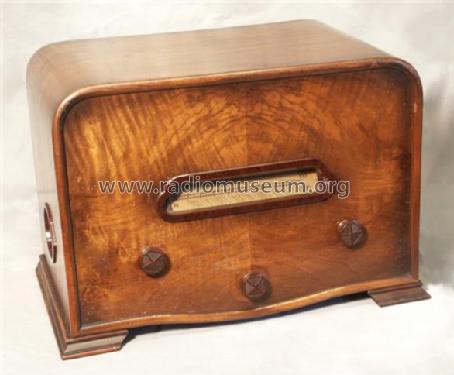Super Ondolina 533C1 220V
SBR Société Belge Radio-Electrique, Bruxelles
- Land
- Belgien
- Hersteller / Marke
- SBR Société Belge Radio-Electrique, Bruxelles
- Jahr
- 1932/1933
- Kategorie
- Rundfunkempfänger (Radio - oder Tuner nach WW2)
- Radiomuseum.org ID
- 229120
- Anzahl Röhren
- 5
- Hauptprinzip
- Superhet allgemein; ZF/IF 123 kHz; Anodengleichrichtung
- Anzahl Kreise
- 7 Kreis(e) AM
- Wellenbereiche
- Langwelle, Mittelwelle (LW+MW).
- Betriebsart / Volt
- Gleichstromnetz-Gerät / 220 Volt
- Lautsprecher
- - Dieses Modell benötigt externe(n) Lautsprecher.
- Material
- Gerät mit Holzgehäuse
- von Radiomuseum.org
- Modell: Super Ondolina 533C1 [220V] - SBR Société Belge Radio-
- Form
- Tischgerät, Truhenform, meist mit Deckel (NICHT Schrägpult).
- Bemerkung
-
- This superheterodyne radio works on a simple wire antenna, where previous SBR superheterodyne models worked with a loop antenna.
- Tuning scales with names and wavelenghts are standard from now on.
- In the 110V DC version there are 2 output pentodes in parallel to compensate for the lower plate voltage, in the 220V DC version there is only 1 output pentode.
- The ballast tube is only for the filaments; the tubes are working on a higher plate voltage than the 110V DC version.
- SBR produced the following models 533:
- 533x1: table model without loudspeaker;
- 533x2: table model with loudspeaker;
- 533x3: luxury console;
- 533x4: luxury console with pick-up;
where 'x' represents 'A' (AC mains) or 'C' (DC mains, 110 or 220V)
- The "251_Ballast" current regulator (250mA; 60-180volt) can be replaced by any other brand of current regulator with the same or better specifications and the same foot (B4), like the Marconi "251_MOV" or the Philips "1934".
- Originalpreis
- 2,700.00 BFr
- Autor
- Modellseite von Dirk Bladt angelegt. Siehe bei "Änderungsvorschlag" für weitere Mitarbeit.
- Weitere Modelle
-
Hier finden Sie 733 Modelle, davon 680 mit Bildern und 416 mit Schaltbildern.
Alle gelisteten Radios usw. von SBR Société Belge Radio-Electrique, Bruxelles
